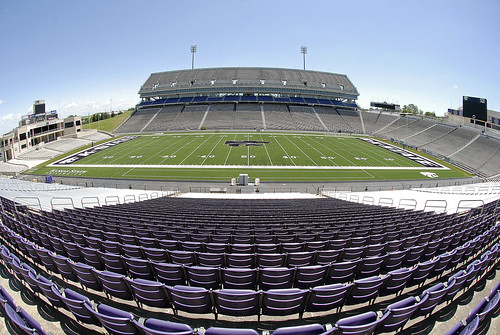
When a Kansas State University football player plants his opponent’s face into the turf, the result may be a better-tasting blend of artificial grass. Turf is not a part of the USDA’s MyPlate recommendations, but defensive ends playing in the Wildcats’ stadium can skip their pre-game soy latte and get their fill during the game instead.
Kansas State claims to be the first NCAA Football Bowl Subdivision institution to install soy-based AstroTurf. The synthetic grass also being used at some Major League Baseball and National Football League stadiums is an environmentally-friendly and sustainable alternative to petroleum-based products. With the help of the United Soybean Board, Kansas State was able to join the ranks of other sports organizations using soy-based turf.
Building global demand for U.S. soybeans is the mission of the United Soybean Board, which recently celebrated its 20th anniversary. The board is administered by USDA’s Agricultural Marketing Service, and is a checkoff program supported by a collective investment from farmers. The funds are used to strengthen the position of soybeans in the marketplace and expand domestic and foreign markets. The Board’s promotion and outreach efforts spur global demand for U.S.-grown soybeans, which has risen by more than 140 percent over the past 20 years.
Over the last 20 years, the cohesive research and development work of the soybean checkoff has identified many new uses for soy, and the Kansas State football field is just one example of the program’s success.
Bob Haselwood, the board’s New Uses Chair, said industrial use of U.S. soy has increased 50 percent since 2006. The animal agriculture sector is the primary user of soybeans for the production of feed, but Haselwood said soybean oil is also applied in the development of paint, cleaners and other products.
The brand of soy-based turf blanketing the Kansas State Wildcats outdoor stadium qualifies for the USDA BioPreferred program. The program promotes the increased purchase and use of biobased products, and is expected to spur economic development, create new jobs, and provide new markets for farm communities. The USDA BioPreferred program compiles a catalog of biobased products.
Biobased products are commercial or industrial products (other than food or feed) that are composed in whole, or in significant part, of biological products, renewable agricultural materials (including plant, animal, and marine materials), or forestry materials. The 2008 Farm Bill extended the definition of biobased products to include biobased intermediate ingredients or feedstocks.
So the next time you watch a Wildcats home football game, remember that the players are literally running on soy. And that the United Soybean Board, under the oversight of USDA, helped bring this sustainable product into the sports arena.
